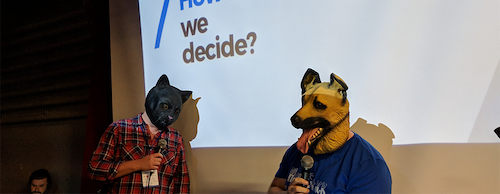
Our Illustrious Presenters
Each of our events has between 8 and 12 sessions. We update our presenter information regularly. We usually save a few details to give you some surprises on the day of the event, including the order of the sessions.
 HalfStack
HalfStackMore to be revealed
This is the start of our 2026 lineup. We will announce more presenters between now and the event.
 Carmen Huidobro
Carmen HuidobroTo be revealed
We have been delighted by building your own Dance Dance Revolution game and more in the past. We will soon share what Carmen has in store for us in 2026!
 Maros Kutschy
Maros KutschyNonviolent Communication in Software Testing
Maros will guide us through the principles of Nonviolent Communication and demonstrate how we can apply them to enhance our daily work.
 Katrin Freihofner
Katrin FreihofnerEliminate the Engineering Department of Redundancy Department
Master the art of efficient decision-making and turn slow, ineffective engineering decisions into a powerful competitive advantage.
 Nik Graf
Nik GrafMine, Cached, and Unclouded
Offline-first apps for people who like their data like their coffee—local and strong.
 Edouard Maleix
Edouard MaleixPurr-mission Denied: Securing Your App with ReBAC
We will share more closer to the event, but there will definitely be cats.
 Michael Bromley
Michael BromleyThe Importance of Simplicity
Something I've been thinking about a lot recently. Simplicity is the most prized property we can strive towards when programming & building. high-level stuff I think would be relevant to any dev.



